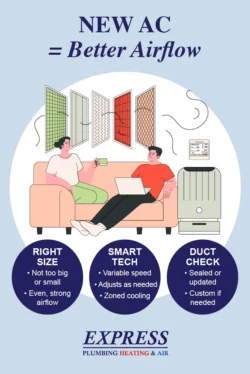Are you dealing with poor airflow in your home? Outdated or poorly maintained air conditioners lead to weak airflow from HVAC vents, forcing your system to run inefficiently, costing you more money, and leaving your home warm, stuffy, and uncomfortable. In this guide, we’ll break down everything you need to know about airflow issues in your home, what causes them, and how a new AC installation can help solve the problem for good.
Understanding Airflow Issues in Your Home
How do you know if you have poor HVAC airflow? Over the years, our team has identified the most common signs of poor airflow, as well as the typical causes. Here are a few symptoms of this problem, and ideas on what might be behind the issue.
What are common signs of poor airflow?
You’ll know that you’re dealing with poor airflow if you notice:
- Inconsistent hot or cold spots throughout your home.
- Noticeable indoor humidity, even when the AC is running.
- Weak airflow from HVAC vents.
- AC unit running continuously, but not properly cooling the home.
If you notice any of these issues, it’s a sign that your air conditioner either needs significant repairs, or is reaching the end of its AC lifespan and needs replacement.
What causes poor airflow in an HVAC system?
There are several possible causes for poor airflow in an HVAC system, and determining which one you’re dealing with will help you decide whether it’s better to repair or replace your system. The main causes of weak HVAC airflow are:
- Undersized unit: AC system sizing is important to get right — your system may not be big enough to efficiently cool your home.
- Aging unit: Old systems often struggle to efficiently distribute air.
- Clogged or leaking ductwork: Blocks or leaks in HVAC ducts can allow air to escape before it reaches rooms in your home.
- Dirty air filters and coils: Excess dust and debris buildup on these components restricts airflow and reduces your AC’s home cooling efficiency.
- Faulty blower motor: A failing motor will be unable to properly push air through the system and into your home.
Some of these issues, such as dirty coils, clogged filters, or leaky ducts, can be repaired. But in some cases, it simply makes more sense to invest in an HVAC system upgrade.
How a New AC Installation Improves Airflow
A new air conditioner will offer countless benefits for your system’s airflow and efficiency, including:
Correct AC sizing for optimal air circulation
Oversized AC units can cause short cycling and airflow issues, leading to reduced comfort and increased energy bills. An undersized unit, on the other hand, leads to inadequate cooling and weak airflow. To avoid these troublesome issues, an installation professional will do Manual J calculations, which helps them determine the correct HVAC unit size for your home using mathematical formulas. The right sized unit will cool your home evenly and efficiently.
Advanced AC technology that enhances airflow
New air conditioners offer advanced technology to enhance airflow and boost efficiency, including:
- Variable-speed compressors for continuous, efficient cooling.
- Multi-stage flows that adjust airflow based on demand.
- Zoning systems for balanced air distribution in multi-story homes.
The role of ductwork in improving airflow
In some cases, the ductwork is the true culprit of poor airflow. When you receive AC installation services, your expert will evaluate the state of your ducts. If they are old or leaky, they may offer new duct sealing and insulation to help maximize airflow. Sometimes, it may make sense to invest in a custom duct design during AC replacement, which will cool larger homes more efficiently.
Additional Benefits of a New AC System
There are even more reasons to consider air conditioning replacement.
Improved energy efficiency & lower utility bills
New AC units have higher Seasonal energy efficiency ratio (SEER) ratings, which means reduced energy consumption and improved efficiency. Better airflow also puts less strain on the system, reducing operational costs and saving you money on repairs.
Better indoor air quality & humidity control
Installing a new HVAC unit will reduce dust, allergens, and mold growth in your indoor air, improving the air quality and keeping you healthier. Many new units also offer dehumidification features, which helps keep your home comfortable and combats mold and mildew growth during periods of high outdoor humidity.
Quiet & consistent comfort
Modern air conditioners operate much more quietly than old ones, despite offering superior airflow. They also excel at evenly controlling temperature across the home, meaning less time opening and closing individual vents.
Choosing the Right AC Installation for Your Home
How do you replace your air conditioner, ensuring peace of mind and quality installation?
When should you replace your AC to improve airflow?
If your air conditioner is 10-15+ years old and struggling with poor airflow, it’s time to think about an upgrade. The same goes for air conditioners needing frequent repairs — not only will a new unit be more reliable, but it will work better and more efficiently as well.
Finding a professional HVAC installer
Next up, you’ll need to find a local HVAC technician you can trust. Your chosen installer should always take the time to ensure proper sizing and installation by doing thorough load calculations and ductwork assessments.
Cost considerations & financing options
Finally, you’ll want to think about your costs and financing options. Many states and cities offer rebates and tax incentives for switching to new, efficient air conditioners, and most AC installation pros offer affordable financing on new units.
Final Thoughts – Solve Your Airflow Issues with a New AC System
Weak, uneven AC airflow can put a damper on those warm, summer months. But with the team from Express Plumbing on your side, you can quickly resolve airflow issues and start enjoying a powerful, energy-efficient air conditioner with exceptional airflow all year-round. To learn more about your options for an HVAC upgrade, contact us today!



